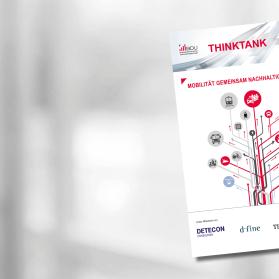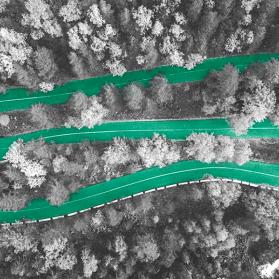Smart mobility and mobility ecosystems — when we converse with various representatives of the logistics and mobility sector about their visions of mobility in the near future, these terms come up again and again. But what exactly do they mean, and what role do data play here? We have been delving deeply into this issue in recent months as part of the study described here. This preview gives you a foretaste of the topics that you can expect to find over the course of the coming year.
Smart mobility is defined as a service that enables energy-efficient, low-emission, safe, convenient, and low-cost mobility. At this time, there is no uniform understanding in the GAS region of what constitutes smart mobility; this is the conclusion that can be drawn from our intense dialogs with numerous mobility experts. But however much the opinions among the colleagues from the industry about the building blocks and dimensions of smart mobility may differ, one thing becomes clear: Digitalization is functioning as a major driver and enabler for smart mobility solutions. In competing for the favors of customers, large volumes of data are already being collected today — in part, without system or structure. The idea is to develop new services and products or to optimize current products and services on the basis of these data. So much for idealistic theory. Is actual practice keeping pace with this thought?
Detecons smart mobility study
To get to the bottom of this and other questions, we have conducted a comprehensive smart mobility study. It involved the investigation of relevant issues revolving around the framework and potential of smart mobility. In addition, the study describes what building blocks and what established as well as up and coming players are required if a mobility ecosystem is to function properly. Our examinations focus on the sensible use of data and the key hubs or platforms of the system. Whether fundamental guarantees of success or even obstacles to data-driven mobility services and products must be considered are only some of the aspects that we question critically and illuminate for you.
This preview article presents the first propositions based on the conclusions of the study.
The results of the study are summarized in succinct propositions based on qualitative personal or telephone interviews with representatives of renowned companies of the mobility sector in the GAS region. These interviews — dialogs lasting several hours on the basis of detailed questionnaires adapted in each case to the specific expertise of the surveyed respondents — have produced highly revealing findings, and some of them will surprise you!
Click here to download the German-language discussion paper:
Smart Mobility - Data Strategies in the Mobility of the Future
Initial Question 1: How can the present situation related to smart mobility be summed up?
Proposition 1: Data are important! But in many cases, it is still not clear precisely which data are needed.
Many companies have recognized the strategic value of data and are busily collecting all kinds of infrastructure and movement data. A majority of the surveyed companies do not know, however, what data will be relevant for competition in the future as well as today. On the other hand, it is definitely clear that data need not be of a personal nature for the general optimization of the mobility ecosystem.
A later goal of carmakers and mobility companies is the collection of data with the sharpest possible focus and the specific storage of the data so that inefficiency can be avoided. At this time, however, a clear understanding about the significance and possible uses of specific data records is still missing; so is a concept of a data strategy drawn up on this basis that must be recognized and implemented throughout the entire company.
Initial Question 2: What recommendations for action are there for the journey to smart mobility?
Proposition 2: Open data are overrated — “shared” is how we progress along the journey into the future.
Smart mobility will be able to take the next step in its development solely by means of a massive expansion of data sharing. But uncompromising open data approaches will probably not be suitable as a means to achieve this. True, the automatic disclosure of data for all offers many different benefits. However, voluntary disclosure frequently goes hand in hand with shortcomings in terms of quality, completeness, and currentness of data. But there is no room for such shortcomings in a smart mobility system based on real time and streamlined for maximum reliability. Moreover, open data simply do not appear necessary for smart mobility solutions. Travelers are interested in high-quality processing of data for their specific and individual travel needs.
Shared-data models that secure the safe exchange of data by means of clear technical standards and contractual regulations are more advantageous for the enablers of a smart mobility ecosystem — from mobility brokers to platform and infrastructure operators. In a system of this type, access to data can also be made possible to startups and individuals, which would foster innovation in the mobility sector. This highly sought innovation is one of the major arguments in favor of open data systems. But structuring the general conditions required for this represents a huge challenge.
Initial Question 3: How can data protection and smart mobility be reconciled?
Proposition 3: The “transparent citizen” is not necessarily a prerequisite for a smart traffic system.
Data protection advocates can breathe again: Turning travelers into “transparent citizens” is not necessary for the intelligent design of a mobility ecosystem. In concrete terms, most of the respondents in the study expect the greatest added value from the analysis of aggregated, anonymized movement data. This is an adequate basis for decisive improvement in safety, services, infrastructure planning of cities, and mobility hubs as well as for mobility development in general. For the foreseeable future, preference-based routing features for individual travel planning will not be at the focus, but are regarded more as the “crowning touch.” Moreover, digital solutions such as blockchain-based data wallets and “forgetful” IT systems can be used to put together personalized offers without the disclosure (and certainly without permanent storage) of sensitive customer data to mobility service providers. One major challenge for mobility providers will be to gain public trust in their technologies through transparency and clever solutions.
Have we piqued your curiosity about smart mobility?
Would you like to hear more details about the propositions above and obtain deeper insights into the topics of data strategy, handling of data, and data security in relation to the next generation of mobility? Our most recent Red Carpet Event (see also Mobility-as-a-Service Wave Is Rolling) was another opportunity we seized to interact with experts from the smart mobility sector and to talk to them about these topics.
We will be discussing in detail the propositions mentioned here as well as other findings as part of a series of publications in this year and will supplement them with the smart mobility framework and other interesting aspects. Next, we want to take a closer look at the proposition «Open data are overrated — “shared” is how we progress along the journey into the future» in one of our articles. In addition, you have the opportunity to talk to one of our experts about the fascinating topics and to share your ideas with us. Feel free to write an email and send it to us at smart.mobility@detecon.com.








